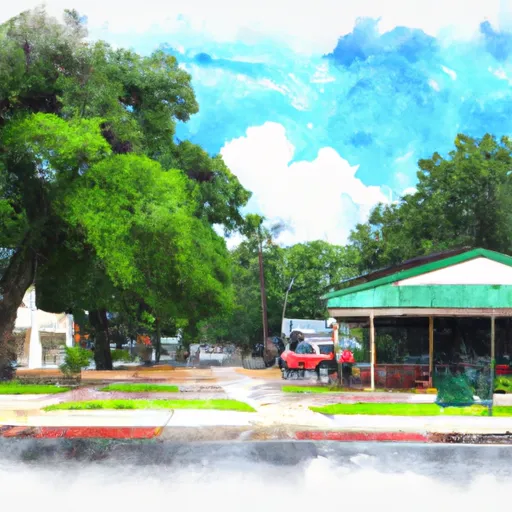-
 Snoflo Premium
Snoflo Premium
Get unlimited access to all our content
With no Ad interruptions! - Start Your Free Trial Login with existing account
Mc-Intosh
Eden Index
Climate
7.5
•
Recreation
4.5
•
Community
0.8
•
Safeguard
4.8/10

McIntosh, Florida is a small town located in Marion County, known for its picturesque natural beauty and unique outdoor recreational opportunities. The town enjoys a subtropical climate, characterized by hot, humid summers and mild winters. Summers are typically long and wet, with frequent thunderstorms and average temperatures reaching the low 90s°F (mid-30s°C). Winters are short and mild, with temperatures rarely dropping below freezing.
The hydrology constituents of McIntosh are dominated by the Ocklawaha River, which runs through the town's western edge. This river provides excellent opportunities for fishing, boating, and kayaking. Additionally, there are numerous lakes and ponds scattered throughout the area, offering further water-based recreational activities.
Outdoor enthusiasts will find ample opportunities for exploration and adventure in McIntosh. The town is surrounded by lush forests and nature reserves, providing opportunities for hiking, bird-watching, and wildlife spotting. The nearby Ocala National Forest offers over 600 square miles of preserved land, with trails for horseback riding, mountain biking, and off-roading.
In summary, McIntosh, Florida offers a subtropical climate with hot, humid summers and mild winters. The town's hydrology constituents are mainly dominated by the Ocklawaha River, providing various water-based recreational opportunities. With its abundant forests, nature reserves, and proximity to the Ocala National Forest, McIntosh offers a haven for outdoor enthusiasts seeking adventure and exploration.
What is the Eden Index?
The Snoflo Eden Index serves as a comprehensive rating system for regions, evaluating their desirability through a holistic assessment of climate health, outdoor recreation opportunities, and natural disaster risk, acknowledging the profound impact of these factors on livability and well-being.
Climate Health Indicator (CHI): 7.5
Mc-Intosh receives approximately
1310mm of rain per year,
with humidity levels near 89%
and air temperatures averaging around
21°C.
Mc-Intosh has a plant hardyness factor of
9, meaning
plants and agriculture in this region tend to thrive here all year round.
By considering the ideal temperature range, reliable water supplies, clean air, and stable seasonal rain or snowpacks, the Climate Health Indicator (CHI) underscores the significance of a healthy climate as the foundation for quality living.
A healthy climate is paramount for ensuring a high quality of life and livability in a region, fostering both physical well-being and environmental harmony. This can be characterized by ideal temperatures, reliable access to water supplies, clean air, and consistent seasonal rain or snowpacks.
Weather Forecast
Streamflow Conditions
St. Johns
Area Rivers
St. Johns
Snowpack Depths
St. Johns
Reservoir Storage Capacity
St. Johns
Groundwater Levels
Recreational Opportunity Index (ROI): 4.5
The Recreational Opportunity Index (ROI) recognizes the value of outdoor recreational options, such as parks, hiking trails, camping sites, and fishing spots, while acknowledging that climate plays a pivotal role in ensuring the comfort and consistency of these experiences.
Access to outdoor recreational opportunities, encompassing activities such as parks, hiking, camping, and fishing, is crucial for overall well-being, and the climate plays a pivotal role in enabling and enhancing these experiences, ensuring that individuals can engage in nature-based activities comfortably and consistently.
Camping Areas
| Campground | Campsites | Reservations | Toilets | Showers | Elevation |
|---|---|---|---|---|---|
| Silver Lake - Withlacoochee State Forest | 23 | 78 ft | |||
| Holder Mine - Withlacoochee State Forest | 13 | 34 ft | |||
| Hillsborough River State Park | None | 58 ft | |||
| Hog Island - Withlacoochee State Forest | 20 | 72 ft | |||
| Lithia Springs | None | 51 ft | |||
| Withlacoochee River Park | 10 | 94 ft | |||
| Cypress Glen - Withlacoochee State Forest | 34 | 72 ft | |||
| Crooked River - Withlacoochee State Forest | 26 | 72 ft | |||
| River Jct - Withlacoochee State Forest | 20 | 67 ft | |||
| Edward Medard | None | 79 ft |
Catastrophe Safeguard Index (CSI):
The Catastrophe Safeguard Index (CSI) recognizes that natural disaster risk, encompassing floods, fires, hurricanes, and tornadoes, can drastically affect safety and the overall appeal of an area.
The level of natural disaster risk in a region significantly affects safety and the overall livability, with climate change amplifying these risks by potentially increasing the frequency and intensity of events like floods, fires, hurricanes, and tornadoes, thereby posing substantial challenges to community resilience and well-being.
Community Resilience Indicator (CRI): 0.8
The Community Resilience Indicator (CRI) recognizes that education, healthcare, and socioeconomics are crucial to the well-being of a region. The CRI acknowledges the profound impact of these elements on residents' overall quality of life. By evaluating educational resources, healthcare accessibility, and economic inclusivity, the index captures the essential aspects that contribute to a thriving community, fostering resident satisfaction, equity, and social cohesion.

